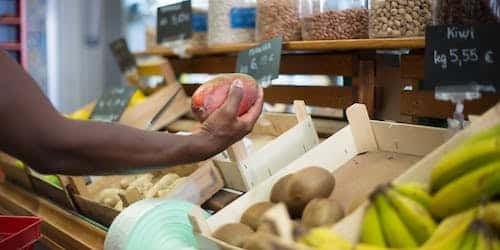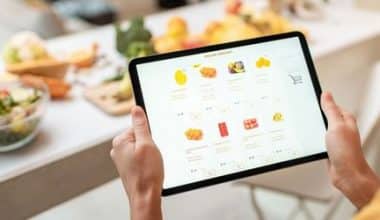If you need to establish a business, it’s not a bad idea with all the successful FMCG companies in Nigeria. FMCG, or fast-moving consumer goods, is the term used. These are the daily goods that you use. Food and drink, groceries, personal hygiene products, cleaning supplies, stationery, and other items are examples of fast moving consumer goods.
Because they are cheap, a lot of people can still purchase them even in an era of inflation. For anyone wishing to start a business in Nigeria, FMCG distribution is a wise option.
The majority of these goods, including food and drinks, which account for around 40% of FMCGs, have a limited shelf life. This suggests that the FMCG distribution sector will remain relevant for a very long time due to its high turnover rate. Let’s examine how to launch this business effectively.
If you are still confused as to how this industry works, then read our detailed article on what FMCG (Fast Moving Consumer Goods) is all about.
What is Fast Moving Consumer Goods (FMCG)?
The term “fast-moving consumer goods” (FMCG) describes goods that move swiftly and for a reasonable price. Products including food, drinks, personal hygiene products, and cleaning supplies for the home are seen as needs and are frequently used by consumers.
What is the Fast Moving Consumer Goods (FMCG) Distribution Business in Nigeria?
The process of selling and distributing fast-moving consumer goods, such as food and beverages, personal care products, and household items, to retailers and customers is known as the Fast-Moving Consumer Goods (FMCG) Distribution Business. This business sources goods from producers and distributors, stores them in a warehouse or distribution center, and then distributes them to merchants or consumers directly through a variety of channels.
It is critical to comprehend supply chain management, market trends, and consumer preferences in order to operate a profitable FMCG distribution business. Market analysis and research can be used to find business growth prospects and possible obstacles.
Due to rising earnings, urbanization, and population expansion, there is a growing demand for consumer goods in Nigeria and throughout Africa, which has a substantial economic impact on the FMCG sector. There is fierce competition in the market as both domestic and foreign businesses fight for market dominance. However, there are also chances to export to other African nations, which might offer substantial expansion opportunities for FMCG distribution enterprises.
Benefits of FMCG Distribution in Nigeria
If launching an FMCG distribution business is on your radar, you’re doing the right thing because it offers numerous advantages, such as:
- Demand for FMCG products is very high.
- There is a wide variety of products available.
- It carries less risk than other business models.
- The lucrative margins and strong return on investment (ROI) of the FMCG sector make it profitable.
- Why Setup costs are not unaffordable because the business models of several FMCG makers have shown to be viable.
- In this field, little to no technical experience is required. Anybody can work for this company, regardless of social position, background, or educational achievements.
How to Launch a Profitable Nigerian FMCG Distribution Company
We have provided a list of procedures for launching an FMCG distribution business, regardless of where in Nigeria you live. Now, let’s review them.
#1. Training
Prior to beginning this business in a comfortable manner, you will need to acquire a few essential abilities through reading, research, or training. Although buying and selling may be the foundation of the wholesale distribution business, doing so can be challenging without the right knowledge or abilities. Wholesale wholesalers, for instance, are skilled at managing about-to-expire goods so they don’t lose money.
Having said that, a wholesale distributor would be knowledgeable about many aspects of running a successful business that a novice might not be. For this reason, it is essential that you receive training and pick up some fundamental business skills.
#2. Decide which FMCG brands to carry.
One fantastic thing about the FMCG industry is the abundance of options available in terms of both domestic and international brands. You have to figure out which ones are the most well-liked by the local clientele and make the fastest progress with them. It has been discovered that some products operate differently across the country.
#3. Register and incorporate your company
Subsequently, a business registration form must be submitted to the Corporate Affairs Commission (CAC). This service, like business strategies, is given by consultants, especially lawyers. It’s easy as soon as CAC grants approval for your preferred business name.
#4. Compose a thorough business plan.
A business strategy is essential for all businesses, regardless of size. Your company, its aims and objectives, your target market, and your strategy for reaching them are all mentioned in your business plan. You can obtain capital for your company more readily if you have a strong business plan in place since it should include budgets, estimations, and financial projections.
Based on your firm’s aims and objectives, the business plan serves primarily as a tool to assist you assess whether or not your company is hitting its targets. Your business’s prosperity will be apparent to potential investors. Therefore, you must create a solid business plan before you begin. I really advise you to seek expert assistance for this.
#5. Obtain a warehouse and an office space.
To get started in this business, you’ll need a warehouse or storage area. This is due to the fact that the majority of companies will ask to see proof that you have a place where they may store their goods. If you’re a low-income entrepreneur, however, you can begin by storing your goods at your home (as long as you have enough storage space) or, if you have one, in your vehicle.
The truck must, of course, be securely fastened. You can easily convert a portion of your warehouse into an office if you’re a new startup and don’t necessarily require a large amount of space. Reduce your start-up capital by converting your garage into an office if you want to utilize your house for storage.
#6. Initial payment
Before you can register and begin receiving their items, many large, well-known manufacturing companies may ask you to make a deposit. For this reason, if you just have a small amount of money, I advise working with more recent manufacturing companies who are still in need of distributors, even though some others could insist that you begin with a half-trailer of their products. The only thing you have to be cautious about is choosing things that are in demand before committing to them.
#7. Locate and sign up with producers
The next step is to search for and register with manufacturing companies that can support your distributorship business, taking into account your unique financial situation and operating budget. This is due to the possibility that it could be challenging for a newcomer to become a wholesale distributor for manufacturing companies that currently have a large number of distributors.
In order to solve this issue, it is simple to find new companies that are still in need of additional wholesale distributors for their goods. For distributorship rights, manufacturers typically require a distributor to be registered with their business and fulfill certain requirements.
#8. Obtain a way to get around.
Next, in order to properly launch your FMCG distributorship business, you will want a car, preferably a large truck or van, to transport your goods to more stores or sub-distributors. If you don’t currently have a vehicle or the resources to get one, you can start by renting one. Without a truck, your distribution business cannot be conducted profitably.
This is because you will require a vehicle to transport your goods from the manufacturing facility to your warehouse, as well as from your warehouse to nearby retail locations and sub-distributors. Instead than waiting for your clients to come to you for things, you should constantly bring them to them; if you don’t, you risk losing them. Therefore, make sure you have a dependable mode of transportation before you really get going.
#9. Recognize your target demographic and clientele
Of course, having a firm grasp of the market and your clientele is essential before starting any kind of business. Make an effort to locate the retailers you intend to sell your goods to and convince them to list you as their primary source. Making your goods significantly less expensive than those of other distributors nearby is one market penetration strategy you could need to use as a new start-up.
This will guarantee that your company attracts a large number of clients. In the process, experiment with additional marketing and promotion techniques that will quicken the expansion of your distributorship business’s clientele.
Clearly defining your target market is essential in this kind of business. Your advertising and marketing plans should be built around this.
#10. Establishing enduring connections with your clients
Your business’s success is mostly dependent on your capacity to connect with and build deep bonds with your clients. Your business’s current objective shouldn’t be to earn a profit. In order to establish a long-lasting relationship with potential clients, now is the time to locate and engage with them.
Making fast order fulfillment your top priority, providing excellent customer service, and enhancing the business of your sub-distributors and merchants are all important. Never undervalue the importance of enduring relationships with and loyalty from your customers. During this stage of your business, you should concentrate more on that; money will follow. First things first, though. Alright?
Show real interest in your clients’ enterprises’ growth and success. My motto is, “The happier your customers, the merrier your business!” Alright. But really, just curb your need for money for the time being and substitute it with a hunger to support your clients’ enterprises.
#11. Advertise your goods and services.
At this stage, you are practically ready to take off. Begin by telling your friends and relatives about your new business. Promote your business on Facebook, WhatsApp, and other social media platforms. Sign up for the relevant business chambers and trade groups. Continue distributing the word. Seek out mentors who can act as your guides as well.
Challenges Faced by the FMCG Industry in Nigeria
The FMCG market in Nigeria has a lot of room to grow, but it also faces some obstacles.
#1. Deficits in Infrastructure
Inadequate power supplies, inadequate transportation, and inadequate logistical infrastructure make it challenging for FMCG companies to effectively reach distant locations. These difficulties frequently lead to higher expenses and delayed deliveries.
#2. Chain of Supply
Nigeria’s large geographic area and patchy distribution networks make it difficult to maintain a seamless supply chain. To properly meet consumer needs, FMCG companies need to invest in strong logistical infrastructure.
#3. False Goods
The market’s availability of fake goods erodes consumer confidence and damages brand reputation. FMCG companies need to use consumer education, authentication technologies, and stronger regulations to tackle this problem.
#4. Volatility of Currency and Inflation
The cost of raw materials, production, and pricing tactics are all impacted by the volatility of the Nigerian economy and inflation. In order to satisfy price-conscious consumers and retain profitability, FMCG companies must create efficient pricing strategies.
5 Profitable Quick-Ship Products You Should Purchase Right Now
Here are 5 profitable FMCG industries you may invest in right now if you’re considering launching a small business in the fast-moving consumer goods sector, either as an original manufacturer or as a distributor:
#1. Processed Food
One of the biggest global markets for fast-moving consumer goods (FMCG) is processed food. People’s insatiable desire to devour junk food, whether it be offered in restaurants, bus stops, or while stuck in traffic, never goes away.
#2. Drinks
Any liquid that isn’t water is considered a beverage, and this includes a wide range of items such as milk, juice, coffee, soft drinks, beer, and much more.
Thousands of individuals around the nation spend their evenings sipping beer of some kind. For soft drinks, the same holds true. Most individuals drink a bottle of Coca-Cola, Pepsi, or another soft drink while eating at restaurants, schools, gatherings, or even at home.
#3. Cosmetics and Personal Care Items
In recent years, the usage of grooming and cosmetic goods has increased dramatically. Far too many women worldwide are unable to leave their houses without applying cosmetics. It becomes even more serious because many women always have makeup in their handbags, ready to apply whenever they have an important meeting.
#4. Toiletries, detergents, and soaps
Most people take a bath as soon as they get up in the morning. They use the toiletries to clean up after using the restroom, and whether they wish to wash by hand or in a machine, they use bar soap or detergent.
#5. Products for Baby Care:
About 353,000 babies are thought to be born every day, according to Unicef. This number essentially suggests that both the potential revenue volumes and the market size for infant products are growing every day. Several well-known baby product companies, like Pampers, Cussons, Honest, and many more, have become well-known both internationally and in their home nations.
What are the Richest FMCG Companies in Nigeria?
Nigeria’s top consumer goods companies made N504 in revenue in the first half of 2022. 7196 billion, which is more than their N126 in earnings. 08 billion by 2021.The top five companies are Cadbury Nigeria Plc, Unilever Plc, Dangote Sugar Plc, and Nascon Plc.
What is the Fastest Growing Category in FMCG?
OTC and health supplementation is the fastest-growing sector, with a 15.1% value growth rate in Q2 2022. Retail sales figures demonstrate that consumers are willing to spend money on product features and categories that address essential demands like wellness and health.
What is the Difference Between Consumer Goods and FMCG?
Products that consumers use (almost) every day are referred to as FMCG.CPG goods are routinely bought. Contrarily, FMCG can be viewed as a subset of CPG, consisting of a selection of goods that tend to sell a bit fast.
How Do I Grow My FMCG Business?
The following are some tactics Nigerian FMCG companies can use to boost sales:
- Recognize the needs of your customers.
- Boost and effectively manage sales.
- assembling all participants in the process on digital platforms and tools.
- Make a plan for your savings from the ground up.
- Organize your business well.
Final Thought
Participating in a business is the best method to learn about it. You may not be aware of certain truths and secrets until you’re in the thick of things.
Thus, be on the lookout for new opportunities. Join their social media pages and newsletters. Direct questioning is another option available to you.
- DISTRIBUTION MANAGEMENT: Definition, Benefits, and Software Solution
- What Is Distribution? Channels Of Distribution In Nigeria
- FMCG: All You Need About The FMCG Industry In Nigeria
- CHANNEL PARTNER: Definition, Strategy & All to Know
- What Is Network Marketing? Benefits of Network Marketing In Nigeria






